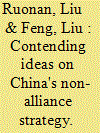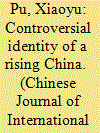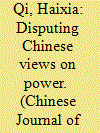|
|
|
Sort Order |
|
|
|
Items / Page
|
|
|
|
|
|
|
| Srl | Item |
| 1 |
ID:
153026


|
|
|
|
|
| Summary/Abstract |
As China’s rise continues to shape its role in international affairs, Chinese international relations scholars are engaging in a lively debate about the country’s grand strategy, particularly surrounding whether or not China should abandon the non-alliance strategy it has adopted since the early 1980s. Some scholars contend that a non-alliance strategy cannot safeguard China’s national interests in the face of the United States’ security alliance network throughout East Asia, and that without allies China’s rise will be contained by the US. Pro-alliance scholars, therefore, are especially favourable towards a formal alliance with Russia. However, orthodox scholars in favour of supporting the official position of non-alliance argue that a formal alliance deviates from the fundamental principles of independence and self-reliance that have historically guided China’s foreign policy. Moreover, a number of alternative strategies have been proposed to replace or complement the non-alliance strategy, among which are quasi-alliances, coalitions, and strategic partnerships. In practice, whether or not China forms alliances with other powers and neighbouring states depends on its self-defined role within the current international system, as well as its perception of external security threats. Considering both the external and internal constraints it faces, China is highly likely to maintain the non-alliance stance while pursuing other desirable approaches to making friends and partners.
|
|
|
|
|
|
|
|
|
|
|
|
|
|
|
|
| 2 |
ID:
153025


|
|
|
|
|
| Summary/Abstract |
How a rising power adapts to its new status is an important challenge in international relations. Since the global financial crisis, Chinese scholars have hotly debated China’s international positioning. The ongoing debate reveals a high level of uncertainty about China’s position in the world. While the notion of the ‘revival of the Chinese nation’ implies the clear goal of ‘making China great again’, China’s ultimate place on the global stage is unclear. Many Chinese scholars might want China to become richer and stronger, but disagree on whether or not China should eventually seek superpower status. Regarding strategies, Chinese scholars also debate whether China should maintain a low profile or strive for greater achievements in global affairs. This article takes a ‘status signalling’ approach to explain why Chinese scholars take various positions in this debate. Status signalling aims either to change or maintain a special type of ‘status belief’ among relevant political actors. China must manage its conflicting roles in ways that advance its interests but do not engender dangerous misperceptions. In particular, China must balance the competing incentives between resolve and reassurance, status and responsibilities, and the domestic and international audience. These competing incentives have shaped the Chinese debate on international positioning.
|
|
|
|
|
|
|
|
|
|
|
|
|
|
|
|
| 3 |
ID:
153027


|
|
|
|
|
| Summary/Abstract |
‘International Responsibility’ has become one of the most significant topics in Chinese International Relations studies over the last decade. Although growing numbers of scholars have focused on this issue, there remains a low awareness of the need to explore its roots in China’s academia, and to investigate the internal debates that display the different Chinese perceptions of international responsibility. This article provides a discourse-activation framework to explain why Robert B. Zoellick’s speech polarized China’s attention on international responsibility. It moreover constructs a typological framework based on dimensions that include the nationalism–internationalism orientation and degree of fulfilling international responsibility. It singles out three camps of scholars and their respective viewpoints on international responsibility and China’s relevant policies in this regard, and demonstrates the ‘divergent convergence’ feature that characterizes the debate on the topic. In addition to this structural analysis, the article also summarizes the overall trend from 1950 to 2015 of the preventative to projecting preferences apparent in China’s academic studies and political discourses on international responsibility. Subsequently, the article briefly investigates the possible factors affecting convergence and divergence of perceptions of international responsibility, which imply that fulfilling international responsibility is crucial to China’s growing presence on the global stage, and that Chinese academics’ attention to international responsibility should focus on collaboration towards improving the effectiveness of China’s assertive behaviour in international affairs.
|
|
|
|
|
|
|
|
|
|
|
|
|
|
|
|
| 4 |
ID:
153028


|
|
|
|
|
| Summary/Abstract |
The concept of power, a keyword in International Relations (IR) theory, has long polarized academic attention in China. In the 1990s and early 21st century, many Chinese academics concentrated their energies on gauging the comprehensive national power of major world powers. But, in contrast to their foreign peers, Chinese scholars have tended to underestimate China’s comprehensive national power. In the first decade of the 2000s, soft power superseded comprehensive national power as a main focus of attention in China’s academia, and variations in China’s foreign policy accompanied this shift of scholarly focus. Traditional policies such as ‘keeping a low profile’ and ‘never seek hegemony’ were questioned, while new slogans, such as ‘be a responsible great power’ and ‘peaceful rise’ gained more support. The study of Chinese scholars’ perception of power is helpful for understanding China’s foreign policy choices.
|
|
|
|
|
|
|
|
|
|
|
|
|
|
|
|
|
|
|
|
|